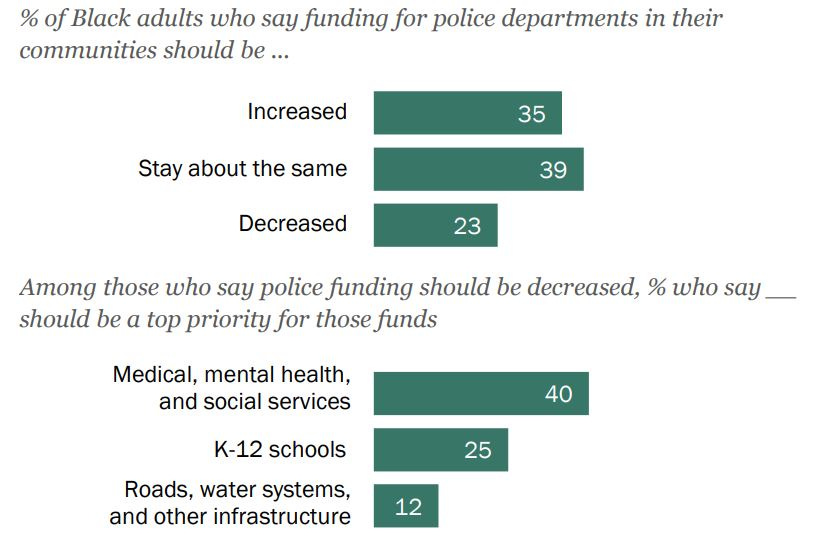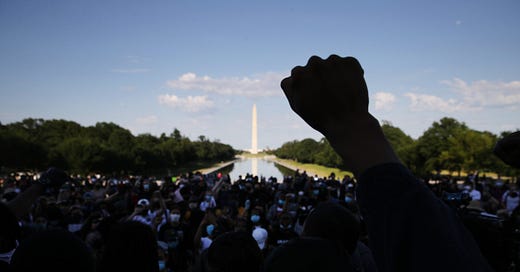
The Black Silent Majority
It has largely been discounted or ignored by the broader political class.
It’s a good practice to periodically reassess what we think we know about the people around us, especially those who aren’t in our social circles. It can be all too easy for us to caricature political groups we are not part of—for those on the left to lump all conservatives, Republicans, and anti-democracy MAGA sycophants together without making distinctions among them, or for those on the right to think liberal pragmatists, Democrats, and economic socialists are just bullshit labels to suggest differences that don’t really exist. Likewise, if there are ethnic or racial groups we don’t interact with regularly, our perceptions of those groups might be similarly distorted.
A few years ago, More in Common published a fascinating study analyzing how flawed our perceptions of others are. On a question about racism, Democrats believed only half of Republicans would say that “racism still exists in America,” but approximately 80 percent of Republicans agreed with that statement. Concerning police, less than half of Republicans thought Democrats would disagree with the view that “most police are bad people”; in fact, 85 percent of Democrats disagreed with it. Unsurprisingly, those with most progressive and most conservative views held the most inaccurate opinions of the other party, which is to say they had the largest perception gaps about what their ideological counterparts think. (Disclosure: I’m the board chair of the U.S. chapter of More in Common.)
I had those findings from More in Common in mind when reading the results of a recent Pew Research report on the views of black Americans. Given all the talk over the last couple of years about defunding the police, reparations, Black Lives Matter, and structural racism, one might think that black Americans universally want to abolish police, receive cash payments from white people for slavery, and prefer that the goal of meritocracy be supplanted with equal outcomes—especially if one’s understanding of black people primarily comes from social media hot takes. For those who pay close attention, these lazy impressions of black politics don’t hold an ounce of water.
The study’s insights point to one central observation: There is a version of the “silent majority” within black America. Now, the label “silent majority” is typically associated with white working-class folks who may bite their tongue in public so as not to appear racist or unpatriotic, but it takes on new meaning when applied to a group that believes racism is the primary obstacle to its ability to enjoy democracy and capitalism in full. I’d summarize it this way: The black silent majority, largely discounted or ignored by the broader political class, is characterized by pragmatism and a reliance on extant institutions to deliver the democratic participation and economic self-sufficiency that pave the surest path to equality.
Consider black Americans’ views on law enforcement. According to the Pew report, 60 percent of black adults say police brutality is an extremely big problem for black communities, and approximately half say the prison system, policing, and the courts need to be overhauled for black people to be treated fairly. Yet three-quarters of black adults believe funding for police departments in their communities should increase or stay the same—there’s virtually no difference between black Democrats and black Republicans on this question. Less than a quarter are for defunding, and of those who are, nearly 80 percent prefer the money be redirected to better healthcare, schools, and infrastructure, all of which contribute to lower crime rates.

Source: Pew Research Center survey of U.S. adults conducted Oct. 4-17, 2021, “Black Americans Have a Clear Vision for Reducing Racism but Little Hope It Will Happen.”
When asked about remedying the disastrous and lingering effects of slavery, 77 percent of black adults support repayment. But when questioned about preferences for how it should occur, 80 percent suggested educational scholarships, and more than three-quarters said financial assistance to start a business or buy a home would be extremely or very helpful—again, these responses were consistent across political ideology from conservative to liberal. Indeed, concerning cash payments, conservatives were actually more supportive than moderates or liberals. As importantly, four in five black voters believe the federal government and banks that profited from slavery should be on the hook to provide such assistance. In other words, for most black folks, reparations looks like the GI Bill—hardly the province of those looking for the American Dream to be gift-wrapped and dropped on their doorstep.
Members of the black silent majority hold on for dear life to their Americanism and their black identity, incessantly seeking ways to help the country reconcile the former with the latter. They place the inequality they experience at the feet of racism but seek to hold institutions—not white people as a group—accountable for the resulting group disparities. To close the distance between them and the rest of America, they want to access the same types of education, labor, business, and home-buying programs that created the white middle class but were largely withheld from them in the early twentieth century.
In other words, they seek the removal of barriers that prevent the full capitalization on their work and ingenuity. What could be more American than this?











